This thread is to talk rationally about the upcoming collapse of industrial civilization.
Some background stuff to get the ball rolling
Here is a paper called Energy and Human Evolution by David Price:
http://dieoff.org/page143.htm
Here are a couple of versions of Richard Duncan's Olduvai Theory:
http://dieoff.org/page125.htm
http://dieoff.org/page224.htm
And here is Requiem by Jay Hanson:
http://dieoff.org/page181.htm
Here are some charts I made recently to try to get an idea of the possible timing of the onset of collapse:
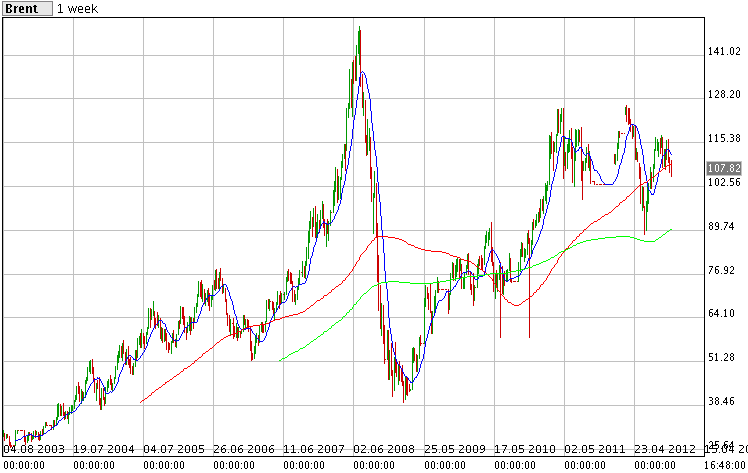
The chart above is the price of the world benchmark Brent crude oil in dollars. Note the massive spike in 2008 and the return to the uptrend after the correction. This is what peak oil looks like.
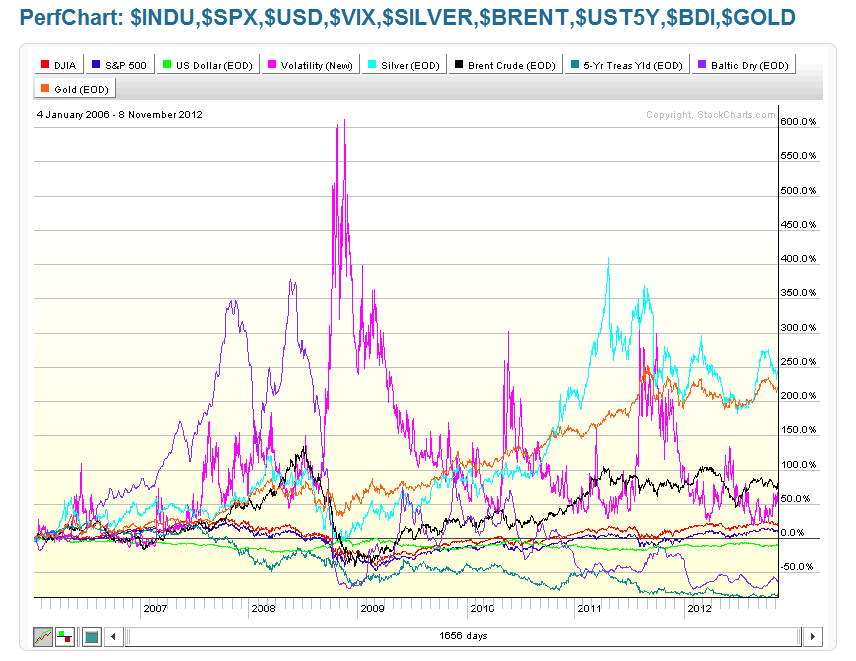
The chart above is a picture of spaghetti! In February of 2005 I read Richard Duncan's Olduvai theory. I reasoned that there should be some way to keep track of the process of decline and look for early warning signs of impending collapse. I began to look for some kind of pattern amongst the myriad financial data available. Ouch! It turned out not to be so simple to find a pattern. Over the years, I kept returning to the problem, with little success. Then, in the last couple of weeks I finally found the key to unravelling the spaghetti.
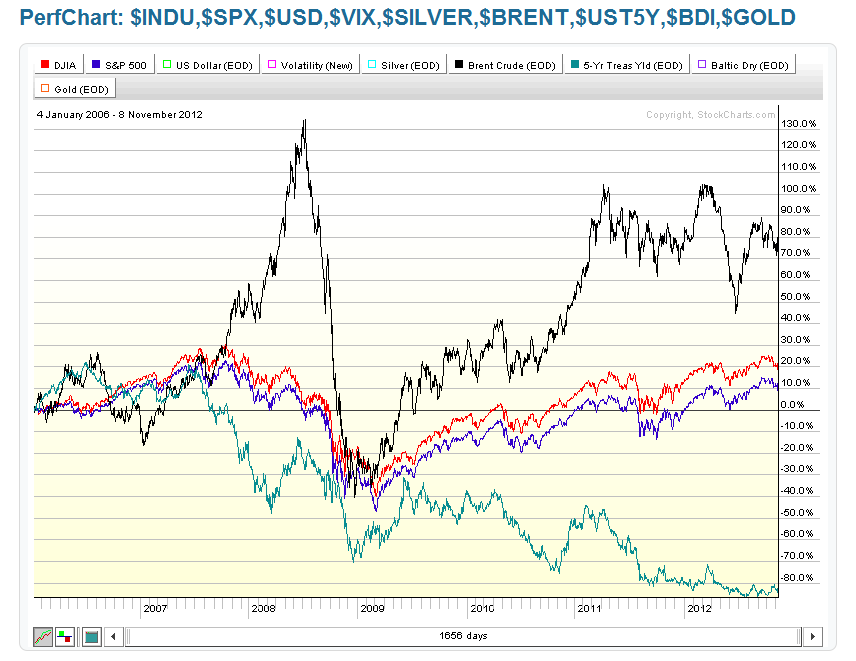
The key to finding a useful pattern was interest rates. In the chart above, I focus on 3 basic indicators --- The price of oil (energy), the value of the stock markets (economy), and interest rates (credit). It turns out that interest rates are related to the the other indicators in a very specific way. Interest rates are the main way the government controls the economy, by lowering rates to stimulate the economy and by raising rates to lower oil prices. The charting system here allows various indicators to be displayed relative to one indicator. When the chart is made relative to interest rates, a striking pattern becomes immediately evident.
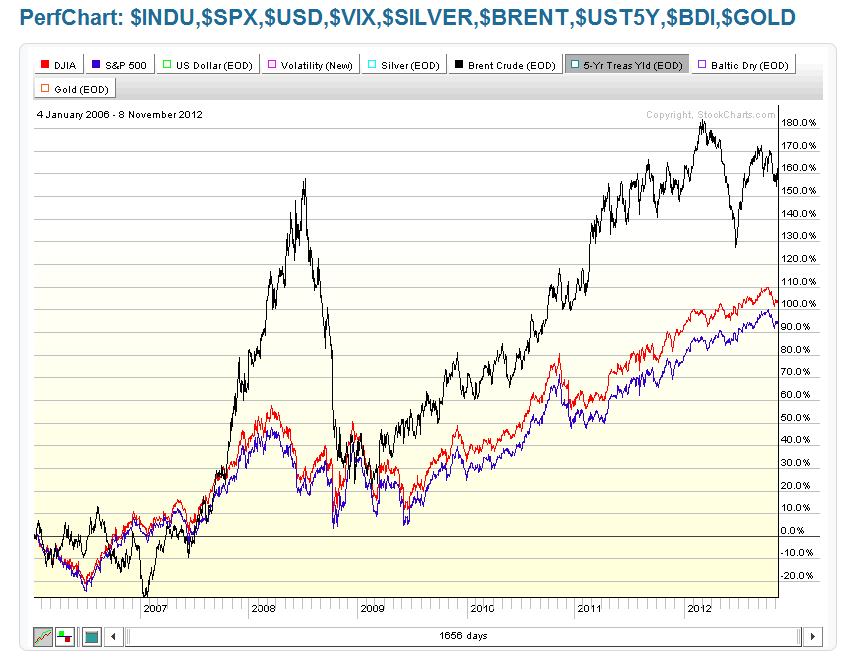
The other indicators now curiously form a rising line. What we see here is a better indicator of the real cost to the economy of rising oil prices. In the previous chart, the price of oil spiked over 130% in 2008 and has not been that high since. But in the interest rate relative chart above, we can see that the real cost of oil actually rose 150% in 2008, and since then it has reached as high as 180%! Also note the most recent activity at the far right. The current market peak corresponds to the latest lows in interest rates. This is very important since interest rates can now no longer be effectively lowered to stimulate the economy. The Fed is now in the position of "pushing on a string" to regulate the economy. Let's take a closer look.
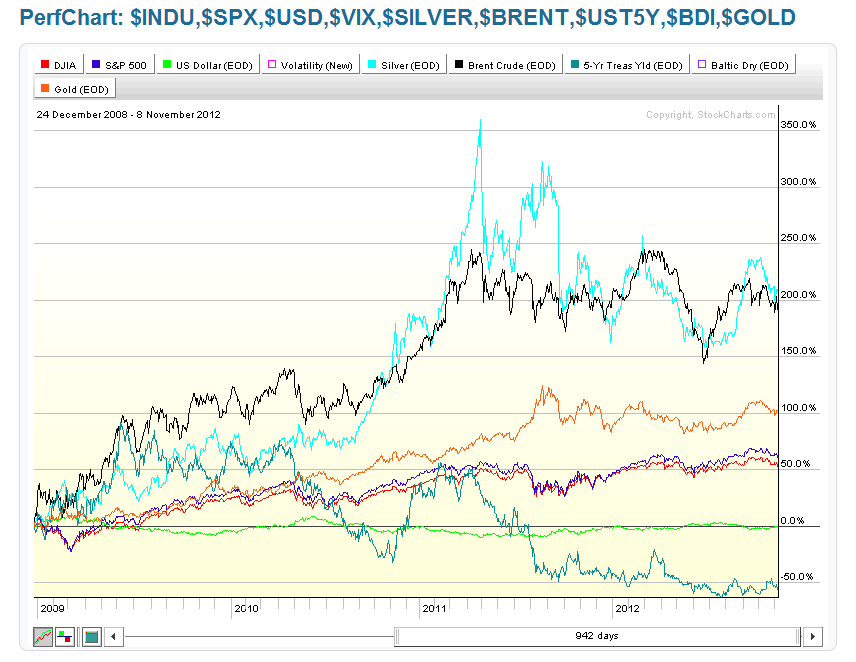
The chart above shows a spaghetti plate of indicators since December of 2009 when oil prices began to recover from their crash. At the bottom right we can see interest rates at their practical low limit. Let's see what the chart looks like relative to interest rates.
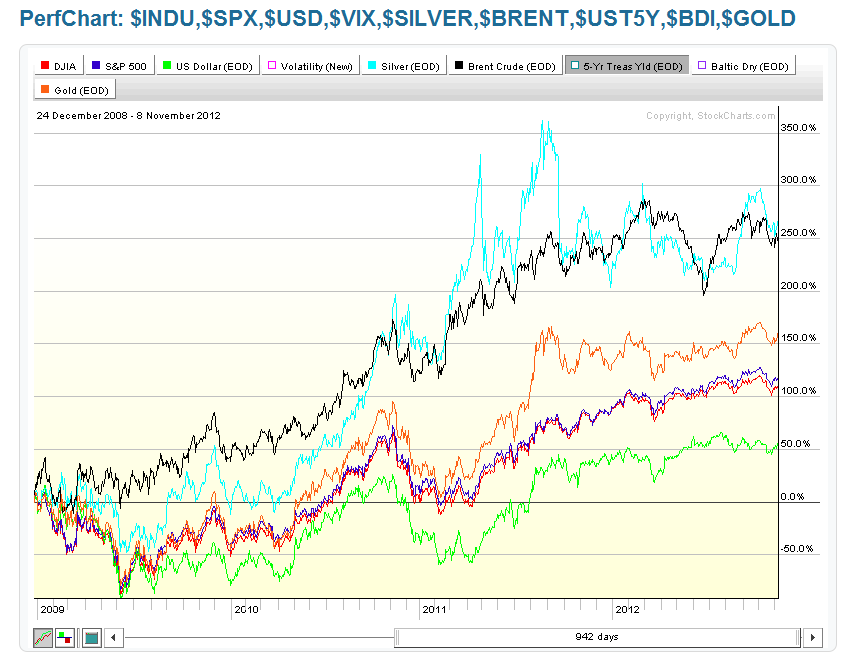
Uh oh, things are not looking good. Oil, metals, the dollar, and the markets are all simultaneously flat lining just as interest rates have hit bottom. In systems dynamics terms, the entire world economic system has just run out of it's normal operating zone. That means we are due for a major state change.
Here is a very interesting and alarming paper on the systems dynamics view of the upcoming situation. For those who have a hard time visualizing how it could all come apart, this should help:
Trade Off: Financial system supply-chain cross contagion – a study in global systemic collapse
Happy New Year, everyone.
---Futilitist
Some background stuff to get the ball rolling
Here is a paper called Energy and Human Evolution by David Price:
http://dieoff.org/page143.htm
Today, many people who are concerned about overpopulation and environmental degradation believe that human actions can avert catastrophe. The prevailing view holds that a stable population that does not tax the environment's "carrying capacity" would be sustainable indefinitely, and that this state of equilibrium can be achieved through a combination of birth control, conservation, and reliance on "renewable" resources. Unfortunately, worldwide implementation of a rigorous program of birth control is politically impossible. Conservation is futile as long as population continues to rise. And no resources are truly renewable. 2
The environment, moreover, is under no obligation to carry a constant population of any species for an indefinite period of time. If all of nature were in perfect balance, every species would have a constant population, sustained indefinitely at carrying capacity. But the history of life involves competition among species, with new species evolving and old ones dying out. In this context, one would expect populations to fluctuate, and for species that have been studied, they generally do (ecology texts such as Odum, 1971 and Ricklefs, 1979 give examples).
The notion of balance in nature is an integral part of traditional western cosmology. But science has found no such balance. According to the Second Law of Thermodynamics, energy flows from areas of greater concentration to areas of lesser concentration, and local processes run down. Living organisms may accumulate energy temporarily but in the fullness of time entropy prevails. While the tissue of life that coats the planet Earth has been storing up energy for over three billion years, it cannot do so indefinitely. Sooner or later, energy that accumulates must be released. This is the bioenergetic context in which Homo sapiens evolved, and it accounts for both the wild growth of human population and its imminent collapse.
Here are a couple of versions of Richard Duncan's Olduvai Theory:
http://dieoff.org/page125.htm
http://dieoff.org/page224.htm
The Olduvai theory has been called unthinkable, preposterous, absurd, dangerous, self-fulfilling, and self-defeating. I offer it, however, as an inductive theory based on world energy and population data and on what I’ve seen during the past 30 years in some 50 nations on all continents except Antarctica. It is also based on my experience in electrical engineering and energy management systems, my hobbies of anthropology and archaeology, and a lifetime of reading in various fields.
The theory is defined by the ratio of world energy production (use) and world population. The details are worked out. The theory is easy. It states that the life expectancy of Industrial Civilization is less than or equal to 100 years: 1930-2030.
World energy production per capita from 1945 to 1973 grew at a breakneck speed of 3.45 %/year. Next from 1973 to the all-time peak in 1979, it slowed to a sluggish 0.64 %/year. Then suddenly —and for the first time in history — energy production per capita took a long-term decline of 0.33 %/year from 1979 to 1999. The Olduvai theory explains the 1979 peak and the subsequent decline. More to the point, it says that energy production per capita will fall to its 1930 value by 2030, thus giving Industrial Civilization a lifetime of less than or equal to 100 years.
Should this occur, any number of factors could be cited as the 'causes' of collapse. I believe, however, that the collapse will be strongly correlated with an 'epidemic' of permanent blackouts of high-voltage electric power networks — worldwide. Briefly explained: "When the electricity goes out, you are back in the Dark Age. And the Stone Age is just around the corner."
The Olduvai theory, of course, may be proved wrong. But, as of now, it cannot be rejected by the historic world energy production and population data
And here is Requiem by Jay Hanson:
http://dieoff.org/page181.htm
Constrained by the laws of thermodynamics, the availability of life-supporting resources will go into a permanent, steep decline.
In many ways, the next hundred years will be the inverse of the last hundred. As fossil fuels dwindle, supply lines collapse, and societies disintegrate, muscle will gradually replace machinery. "Home grown" will replace "imported". Obviously, large cities will be mostly abandoned.
Well-intended activists from both the Left and Right -- armed with facts and ideologies -- will form political movements, select the best liars for leaders, and take to the streets demanding that government take us back to "the good old days". The worse our problems become, the more they will act instead of think. The less they think, the worse our problems will become. Social order will disintegrate, and Roadside Warriors will go mad, killing, raping, torturing, and burning...
It really will be back to the good old days! Shouts of "BRING ME HIS HEAD" will ring through the land, slaves, scalps, souvenirs and trophies of all sorts, ... exciting possibilities limited only by our ingenuity.
The good news is that recycling will finally become fashionable! We will see feral children mining the dumps for plastic to burn (Pampers) so they can heat the hovels they are forced to live in. The strongest kids will set traps for fresh meat -- rats -- while the weaker kids will eat anything they can cram into their mouths (old shoes, styrofoam peanuts, newspaper soup). Pandemics will sweep the world, punctuated every so often by explosions as abandoned and rotting nuclear facilities blow up. Leaking dumps and tanks will spew PCBs and radioactive hazwaste into the feral food chain spawning surprising new shapes for young mothers to enjoy nursing.[55] Toxic chemical fires, blowing garbage and trash, genetic mutations, filthy water, cannibalism ...
As the Easter Islanders say: "The flesh of your mother sticks between my teeth".[56]
The situation will be especially serious for a short time because the population will keep rising due to the lags inherent in the age structure and social adjustment. Then mercifully, the population will drop sharply as the death rate is driven upward by lack of food and health services.[57] Trapped in obsolete belief systems, Americans won't even know why their society disintegrated.
A hundred thousand years from now -- once the background radiation levels drop below lethality -- a new Homo mutilus will crawl out of the caves to elect a leader. Although we have no idea what mutilus might look like, evolutionary theory can still tell us who will win the election. He will be the best liar running on a platform to end hunger by controlling nature.
How could it be otherwise?
Here are some charts I made recently to try to get an idea of the possible timing of the onset of collapse:

The chart above is the price of the world benchmark Brent crude oil in dollars. Note the massive spike in 2008 and the return to the uptrend after the correction. This is what peak oil looks like.

The chart above is a picture of spaghetti! In February of 2005 I read Richard Duncan's Olduvai theory. I reasoned that there should be some way to keep track of the process of decline and look for early warning signs of impending collapse. I began to look for some kind of pattern amongst the myriad financial data available. Ouch! It turned out not to be so simple to find a pattern. Over the years, I kept returning to the problem, with little success. Then, in the last couple of weeks I finally found the key to unravelling the spaghetti.

The key to finding a useful pattern was interest rates. In the chart above, I focus on 3 basic indicators --- The price of oil (energy), the value of the stock markets (economy), and interest rates (credit). It turns out that interest rates are related to the the other indicators in a very specific way. Interest rates are the main way the government controls the economy, by lowering rates to stimulate the economy and by raising rates to lower oil prices. The charting system here allows various indicators to be displayed relative to one indicator. When the chart is made relative to interest rates, a striking pattern becomes immediately evident.

The other indicators now curiously form a rising line. What we see here is a better indicator of the real cost to the economy of rising oil prices. In the previous chart, the price of oil spiked over 130% in 2008 and has not been that high since. But in the interest rate relative chart above, we can see that the real cost of oil actually rose 150% in 2008, and since then it has reached as high as 180%! Also note the most recent activity at the far right. The current market peak corresponds to the latest lows in interest rates. This is very important since interest rates can now no longer be effectively lowered to stimulate the economy. The Fed is now in the position of "pushing on a string" to regulate the economy. Let's take a closer look.

The chart above shows a spaghetti plate of indicators since December of 2009 when oil prices began to recover from their crash. At the bottom right we can see interest rates at their practical low limit. Let's see what the chart looks like relative to interest rates.

Uh oh, things are not looking good. Oil, metals, the dollar, and the markets are all simultaneously flat lining just as interest rates have hit bottom. In systems dynamics terms, the entire world economic system has just run out of it's normal operating zone. That means we are due for a major state change.
Here is a very interesting and alarming paper on the systems dynamics view of the upcoming situation. For those who have a hard time visualizing how it could all come apart, this should help:
Trade Off: Financial system supply-chain cross contagion – a study in global systemic collapse
Overview
This study considers the relationship between a global systemic banking, monetary and solvency crisis and its implications for the real-time flow of goods and services in the globalised economy. It outlines how contagion in the financial system could set off semi-autonomous contagion in supply-chains globally, even where buyers and sellers are linked by solvency, sound money and bank intermediation. The cross-contagion between the financial system and trade/production networks is mutually reinforcing.
It is argued that in order to understand systemic risk in the globalised economy, account must be taken of how growing complexity (interconnectedness, interdependence and the speed of processes), the de-localisation of production and concentration within key pillars of the globalised economy have magnified global vulnerability and opened up the possibility of a rapid and large-scale collapse. ‘Collapse’ in this sense means the irreversible loss of socio-economic complexity which fundamentally transforms the nature of the economy. These crucial issues have not been recognised by policy-makers nor are they reflected in economic thinking or modelling.
As the globalised economy has become more complex and ever faster (for example, Just-in-Time logistics), the ability of the real economy to pick up and globally transmit supply-chain failure, and then contagion, has become greater and potentially more devastating in its impacts. In a more complex and interdependent economy, fewer failures are required to transmit cascading failure through socio-economic systems. In addition, we have normalised massive increases in the complex conditionality that underpins modern societies and our welfare. Thus we have problems seeing, never mind planning for such eventualities, while the risk of them occurring has increased significantly. The most powerful primary cause of such an event would be a large-scale financial shock initially centring on some of the most complex and trade central parts of the globalised economy.
The argument that a large-scale and globalised financial-banking-monetary crisis is likely arises from two sources. Firstly, from the outcome and management of credit over-expansion and global imbalances and the growing stresses in the Eurozone and global banking system. Secondly, from the manifest risk that we are at a peak in global oil production, and that affordable, real-time production will begin to decline in the next few years. In the latter case, the credit backing of fractional reserve banks, monetary systems and financial assets are fundamentally incompatible with energy constraints. It is argued that in the coming years there are multiple routes to a large-scale breakdown in the global financial system, comprising systemic banking collapses, monetary system failure, credit and financial asset vaporization. This breakdown, however and whenever it comes, is likely to be fast and disorderly and could overwhelm society’s ability to respond.
We consider one scenario to give a practical dimension to understanding supply-chain contagion- a break-up of the Euro and an intertwined systemic banking crisis. Simple argument and modelling will point to the likelihood of a food security crisis within days in the directly affected countries and an initially exponential spread of production failures across the world beginning within a week. This will reinforce and spread financial system contagion. It is also argued that the longer the crisis goes on, the greater the likelihood of its irreversibility. This could be in as little as three weeks.
This study draws upon simple ideas drawn from ecology, systems dynamics, and the study of complex networks to frame the discussion of the globalised economy. Real-life events such as United Kingdom fuel blockades (2000) and the Japanese Tsunami (2011) are used to shed light on modern trade vulnerability.
Read the paper (PDF, 1 MB)
Happy New Year, everyone.
---Futilitist
